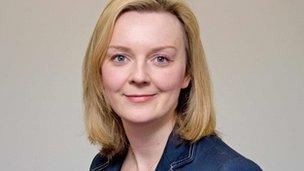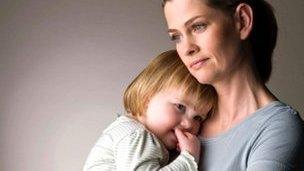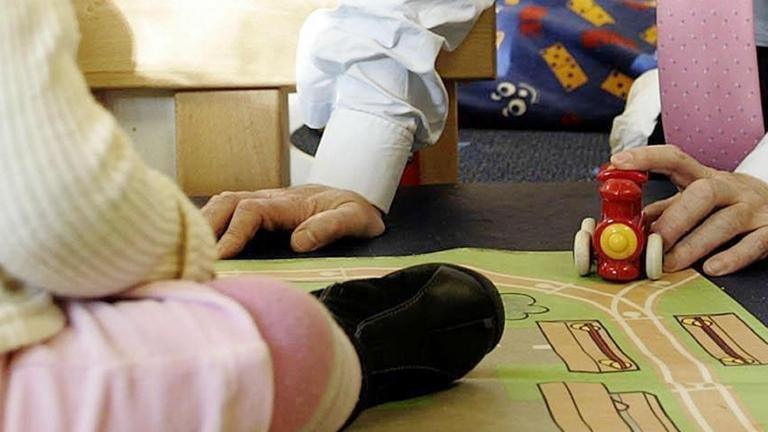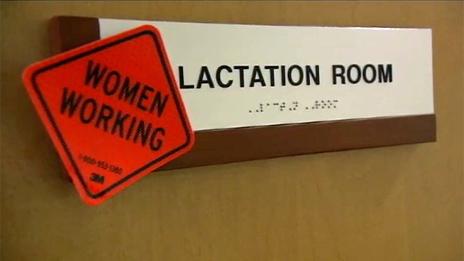Ministers 'plan childcare change'
- Published
- comments
Downing Street plans to announce changes to childcare costs in England and Wales, BBC Newsnight's Allegra Stratton understands.
The UK government is planning to announce changes to how much childcare costs in England and Wales, BBC Newsnight understands.
The plans are believed to include the Conservatives' aspiration to make some provisions tax deductible.
They also include changes to both the qualifications of child minders, and the number of children they are permitted to care for.
They are set to be announced by David Cameron and Nick Clegg in January.
The measures are being driven by Downing Street as it seeks to overhaul how childcare is provided and funded, sources say.
They are expected to outline a rise in the number of children a child minder can care for and changes to their qualifications in an attempt to improve the number of child minder places at the same time as maintain a high level of quality, sources say.
According to the Institute of Public Policy Research (IPPR), the current childcare ratio in England limits one child minder to looking after three children under the age of two.
Government sources Newsnight has spoken to say that this ratio will rise, although they are still unsure to what level.
A change in the ratios has been championed recently by Education and Childcare Minister Elizabeth Truss, who has been drawing on the example of France where five children aged between new born and two years old can be looked after by one minder, compared with three in England.
In France, for children under the age of four, the ratio is one to eight. In the UK, this ratio is one to four.
In recent weeks Mr Clegg, the deputy prime minister, wrote to Liberal Democrat party members saying he was "determined to make sure we do more" to ease the cost of child care.
Ms Truss believes the experience of France illustrates that quality is not jeopardised by higher ratios.
Downing Street sources said Liberal Democrat and Conservative figures alike were now convinced that looser ratios mean nurseries can take more children on which could see staff paid more, and so greater quality staff attracted.
Sources are also predicting a tightening of the qualifications required to set up as a child minder. This would see a change in the focus of the Ofsted inspections, but would also see a demand for greater qualifications from child minders.
One of the problems the government is trying to address is that it believes early years staff are poorly paid.

Elizabeth Truss has been pushing for a shift in child minder to child ratios
Government sources said they had done analysis that showed early years staff in the UK were paid less than their equivalents elsewhere in Europe. In England an average child minder's annual salary is less than the minimum wage at £11,400, whereas in France this is £13,500 and £14,600 in Germany.
Sources say the government plans to make some child care costs tax deductible - potentially up to a third of costs. But it is unclear how the plan would be administered, how many would qualify, or whether or not it will be limited to basic rate tax payers to ensure it is not criticised for funding those who can more easily meet their childcare costs.
Chancellor George Osborne has long held an ambition to allow some or all of the costs of childcare to be claimed back against tax, but sources told Newsnight the idea was "on the table" for inclusion sooner rather later.
Movement on childcare had been expected for inclusion in the government's mid-term review - the document of fresh policy ideas being published by the coalition partners next month - but many inside government now expect the publication of the mid-term review to slip back.
The government remains anxious to make progress on dealing with the costs of childcare so an announcement is currently pencilled in for the first week of January.
Measures on childcare are set to be one of six new policies announced by the government as they detail items they can agree to deliver in the second, more challenging, half of this parliament.
A push to make childcare tax deductible, but limited to women starting up a business, has been led by Mr Osborne's ally Claire Perry, the MP for Devizes, who has argued that over time the cost of the policy would pay for itself as greater numbers of women return to work and their taxes were recouped by the Exchequer.
This has become increasingly critical in the light of research by the Resolution Foundation showing as many as one million women are absent from the workplace because economically it makes more financial sense for them to care for their own children than to pay others to do so.
Figures in both the government and the Labour Party now agree with analysis showing that in order to help living standards recover their vigour of the early 2000s, women need to be encouraged to stay in work.

Many women say it makes better financial sense for them to care for their own children
In 2003, Gordon Brown announced that childcare was at the centre of UK economic policy.
The price of childcare being met by British families has been diagnosed by both the coalition and the opposition as one of the most pressing issues, with the possibility that their differing ways of dealing with it may come into play as an issue in the next general election.
Policy makers across the political spectrum have been grappling with why state spending on childcare is seen as middling compared to other countries by some estimates, and incredibly high by others.
One report published last year by the Organisation for Economic Co-operation and Development (OECD) shows that Britain spends 1.1% of GDP on pre-primary spending for children, higher than the average national spend for other countries. This has been put at £7bn in total.
However the Institute for Public Policy Research in its recent report on childcare costs, Double Dutch, said this figure wrongly incorporated elements which should not be classified as childcare, such as the cost of school for five and six year olds.
A fairer calculation, they say, would put the amount spent by the government on childcare lower. The report authors write: "This makes the UK a middle ranking spender at best, well behind the Nordic nations."
However this has not brought down the costs met by families. According to the OECD's "Doing better for families" report published in 2011 an average British family pays 26.6% of their salary on childcare, while in Europe it is an average of 13% and in Sweden as low as 5%.
The Daycare Trust showed that for 2012, the average cost of childcare is £112 a week - £5,376 a year. They reported that while wages only went up by .3% in 2011, childcare costs increased by 6%.
Britain is ranked at number 16 of OECD countries in its proportions of mothers at work - 67.1% of British mothers compared to 84% in Denmark, 78.5% in Holland and 73.6% in France.
Ms Truss has pushed for reform to regulations imposed on child minders to increase the number of child minding places. If more places can be provided for parents, then the Conservatives believe prices might start to come down.
For a while the minister pointed to the experience of the Netherlands where child minders were more loosely inspected and could take on more children.
However her critics argued that Ms Truss had omitted the extra costs to the Dutch system borne by grandparents - who were already caring for their children - entering the system as child minders and scooping up state funding for a role they were already playing.
To counter her critics, Ms Truss has focused on the experience of France where she believes they manage higher ratios without jeopardising quality.
One particular bottleneck of funding appears where children are in between being cared for by their mother in her maternity leave, but too young for the funding stream which begins at three years old.
- Published28 October 2012

- Published16 July 2012

- Published19 June 2012
